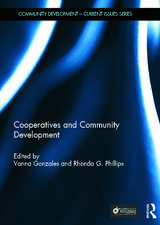Cooperatives Confront Capitalism: Challenging the Neo-Liberal Economy
Autor Peter Ranisen Limba Engleză Paperback – 14 aug 2016
Business co-operatives can offer successful alternative models of decision making, employment, and operation without the existence of managerial and hierarchical structures. Through case studies spanning the United States, Europe, and Latin America—including the first in-depth look at the Cuban co-operative movement, Peter Ranis explores how co-operatives have evolved in response to the recent economic crisis and how the success of co-operatives is spurring the reinvention of labor unions today.
Placing the work of key radical theorists including Marx, Gramsci, and Luxembourg alongside that of contemporary political economists such as Block, Piketty, and Stiglitz, Cooperatives Confront Capitalism provides a unique theoretical synthesis and offers a far-reaching analysis of the ideas, achievements, and wider historical context of the cooperative movement. It will be essential reading for anyone interested in how co-operatives and democratic worker organizations can create a lasting solution to unemployment and poverty.
Placing the work of key radical theorists including Marx, Gramsci, and Luxembourg alongside that of contemporary political economists such as Block, Piketty, and Stiglitz, Cooperatives Confront Capitalism provides a unique theoretical synthesis and offers a far-reaching analysis of the ideas, achievements, and wider historical context of the cooperative movement. It will be essential reading for anyone interested in how co-operatives and democratic worker organizations can create a lasting solution to unemployment and poverty.
| Toate formatele și edițiile | Preț | Express |
|---|---|---|
| Paperback (1) | 149.96 lei 6-8 săpt. | |
| ZED BOOKS – 14 aug 2016 | 149.96 lei 6-8 săpt. | |
| Hardback (1) | 506.67 lei 6-8 săpt. | |
| ZED BOOKS – 14 noi 2016 | 506.67 lei 6-8 săpt. |
Preț: 149.96 lei
Preț vechi: 175.14 lei
-14% Nou
Puncte Express: 225
Preț estimativ în valută:
28.70€ • 31.19$ • 24.13£
28.70€ • 31.19$ • 24.13£
Carte tipărită la comandă
Livrare economică 21 aprilie-05 mai
Preluare comenzi: 021 569.72.76
Specificații
ISBN-13: 9781783606498
ISBN-10: 1783606495
Pagini: 166
Dimensiuni: 140 x 216 x 15 mm
Greutate: 0.18 kg
Editura: ZED BOOKS
Colecția Zed Books
Locul publicării:London, United Kingdom
ISBN-10: 1783606495
Pagini: 166
Dimensiuni: 140 x 216 x 15 mm
Greutate: 0.18 kg
Editura: ZED BOOKS
Colecția Zed Books
Locul publicării:London, United Kingdom
Notă biografică
Peter Ranis is professor emeritus of political science at the Graduate Center of the City University of New York. His books include Class, Democracy and Labor in Contemporary Argentina and Argentine Workers: Peronism and Contemporary Class Consciousness.
Cuprins
Acknowledgements
1 Why worker cooperatives? The historical underpinnings and defense of worker cooperatives
2 The role of the state and the US social economy
3 Worker cooperatives in the post-Occupy digital economy
4 Argentina’s cooperatives challenges and breakthroughs
5 Argentina’s leading edge
6 The proliferation and internationalization of the Argentine cooperative experience
7 Eminent domain: confronting the loss of jobs in the United States
8 Building toward worker cooperatives by the use of eminent domain in the United States
9 Cuban cooperatives as a gateway to economic democracy
10 Toward worker autonomy in the United States
References
Index
1 Why worker cooperatives? The historical underpinnings and defense of worker cooperatives
2 The role of the state and the US social economy
3 Worker cooperatives in the post-Occupy digital economy
4 Argentina’s cooperatives challenges and breakthroughs
5 Argentina’s leading edge
6 The proliferation and internationalization of the Argentine cooperative experience
7 Eminent domain: confronting the loss of jobs in the United States
8 Building toward worker cooperatives by the use of eminent domain in the United States
9 Cuban cooperatives as a gateway to economic democracy
10 Toward worker autonomy in the United States
References
Index
Recenzii
“A refreshing reprise of the significant accomplishments of worker cooperatives in Latin America over the last two decades. In the aftermath of the Occupy movement, Ranis provides a unique roadmap for students and scholars for the practical application of worker cooperatives today and in the years to come.”
“Provides a compelling overview of the potential for worker cooperatives to become a significant alternative to capitalist enterprises, and an innovative argument for the strategic use of eminent domain as a way of publicly supporting the expansion of a cooperative sector.”
“A comprehensive treatment of both the theory of worker-cooperatives and their recent history. It reflects many years of field research and fully incorporates the most recent literature. This book will be indispensable to ongoing discussions about Left strategy.”
“A valuable contribution to both the academic and political fields. Its direct and pleasant style, as well as its clarity and precision, not only makes it accessible but promotes a better understanding of the world we live in.”
“Offers a compelling case for worker cooperatives as antithesis and antidote to the neoliberal juggernaut. Without doubt, this is one of the best critical arguments in support of cooperatives and economic democracy I have recently read.”














